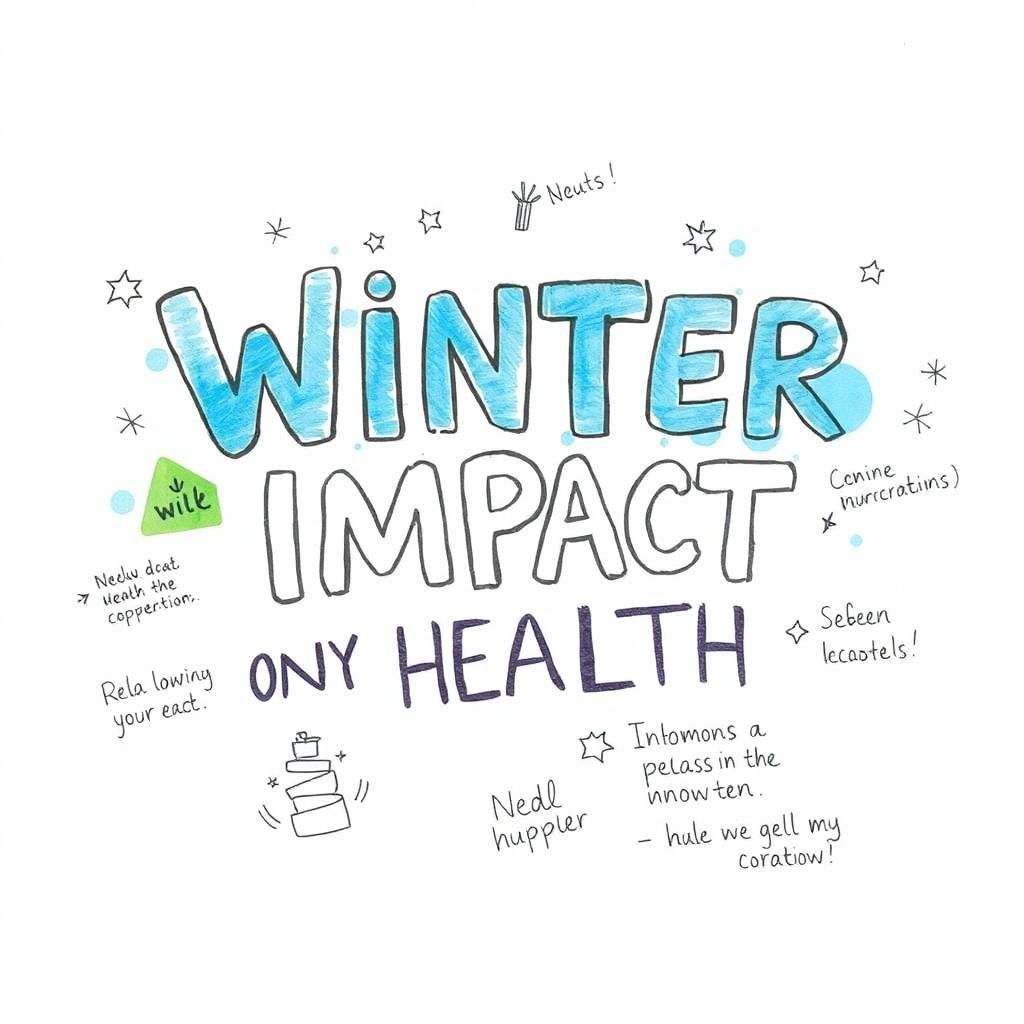Winter Impact on Health, Winter is a season characterized by colder temperatures, shorter days, and a drop in overall humidity. While many enjoy the beauty of snowy landscapes and the coziness of warm beverages, the season also brings unique health challenges. Understanding the impact of winter on health is crucial for adopting preventive measures and promoting well-being during the colder months.
1. Physical Health Challenges
The winter season affects various aspects of physical health due to environmental changes.
a. Increased Susceptibility to Respiratory Infections
Winter sees a rise in cases of colds, flu, and respiratory illnesses. This is partly due to the proliferation of viruses in colder and less humid environments. Spending more time indoors with limited ventilation further facilitates the spread of infectious agents. Common conditions include:
- Influenza
- Bronchitis
- Sinusitis
b. Skin Issues
Cold weather, combined with low humidity, can lead to dry, cracked skin and exacerbate conditions like eczema and psoriasis. The use of indoor heating can also strip moisture from the skin, making it essential to maintain hydration and use moisturizers.
c. Cardiovascular Strain
The drop in temperature causes blood vessels to constrict, leading to increased blood pressure. This can be a concern for individuals with pre-existing heart conditions. Cold weather also increases the risk of heart attacks, as the body works harder to maintain a stable internal temperature.
d. Joint and Muscle Pain
People with arthritis often report worsening joint pain during winter. Cold weather stiffens muscles and joints, limiting mobility and intensifying discomfort for those with chronic conditions.
2. Impact on Mental Health
The seasonal transition significantly influences mental health, primarily due to reduced sunlight exposure.
a. Seasonal Affective Disorder (SAD)
SAD is a type of depression triggered by shorter daylight hours. Symptoms include fatigue, low mood, and loss of interest in daily activities. The lack of sunlight affects the production of serotonin, a mood-regulating neurotransmitter, and disrupts the body’s circadian rhythm.
b. Increased Stress and Anxiety
Financial stress often spikes during winter, due to higher heating bills and holiday-related expenses. This can exacerbate anxiety for many individuals.
c. Isolation and Loneliness
Inclement weather and shorter days may limit outdoor activities and social interactions, leading to feelings of loneliness. Elderly individuals, in particular, are more susceptible to these effects.
3. Dietary and Nutritional Challenges
Diet and nutrition often shift during winter, which can impact overall health.
a. Vitamin D Deficiency
With reduced sunlight exposure, the body may struggle to produce adequate vitamin D. This deficiency can lead to weakened bones, reduced immunity, and even depressive symptoms.
b. Weight Gain
The colder months encourage the consumption of calorie-dense comfort foods, which can lead to weight gain. Reduced physical activity, compounded by holiday feasting, further contributes to this issue.
c. Dehydration
Despite the cold, the body loses water through breathing and other activities. Many neglect hydration during winter, leading to dry skin and increased fatigue.
4. Winter-Specific Illnesses
Certain health conditions are more prevalent or aggravated during winter.
a. Hypothermia
Prolonged exposure to cold weather can cause body temperatures to drop dangerously low. Hypothermia can lead to confusion, slowed heart rate, and in severe cases, death. It is especially risky for the elderly and those without adequate winter clothing or shelter.
b. Frostbite
Frostbite occurs when skin and underlying tissues freeze due to extreme cold. It most commonly affects extremities like fingers, toes, and ears. Prompt treatment is essential to prevent permanent tissue damage.
c. Asthma Exacerbation
Cold air is a common trigger for asthma attacks. Individuals with respiratory conditions need to be cautious and use preventive inhalers when necessary.

5. Positive Impacts of Winter on Health
While winter poses challenges, it also offers certain benefits.
a. Boost to the Immune System
Exposure to cold weather in moderation can stimulate the immune system. Activities like brisk winter walks improve circulation and overall fitness.
b. Calorie Burning
The body burns more calories in colder environments to maintain its core temperature, which can aid in weight management.
c. Improved Sleep Quality
Cooler temperatures are conducive to better sleep. Lowering the thermostat at night can enhance the quality of rest and promote recovery.
6. Preventive Measures for Winter Health
To mitigate the adverse effects of winter, individuals can adopt several strategies.
a. Maintain a Balanced Diet
- Incorporate immune-boosting foods like citrus fruits, leafy greens, and nuts.
- Consume fortified foods or supplements to meet vitamin D needs.
b. Stay Active
- Engage in regular exercise to combat joint stiffness and boost mood.
- Indoor workouts and winter sports can help maintain fitness levels.
c. Hydration and Skincare
- Drink adequate water even if you don’t feel thirsty.
- Use moisturizers to protect the skin from drying out.
d. Dress Warmly
Layered clothing, warm gloves, and insulated footwear are essential to protect against frostbite and hypothermia.
e. Safeguard Mental Health
- Spend time outdoors to maximize sunlight exposure.
- Consider light therapy for combating SAD.
- Stay socially connected through virtual or in-person interactions.
7. Public Health and Winter
Communities and governments play a critical role in addressing the health challenges posed by winter.
a. Vaccination Campaigns
Flu vaccination drives help reduce the incidence of respiratory infections.
b. Emergency Shelters
Providing shelter for the homeless during severe cold waves is a crucial public health measure.
c. Public Awareness Programs
Educational initiatives about hypothermia, frostbite, and other winter-related conditions can save lives.
8. Conclusion
Winter’s impact on health is multifaceted, encompassing physical, mental, and social dimensions. By adopting preventive measures and staying informed, individuals can enjoy the season while minimizing its adverse effects. Communities and governments also have a role in ensuring public health during this challenging time. Embracing the season with preparation and awareness allows for a healthier and more fulfilling winter experience.

12 thoughts on “Winter Impact on Health”
Comments are closed.